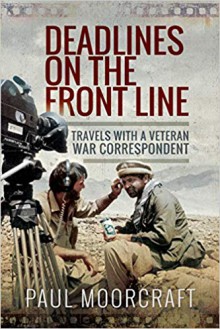
Thanks to Rosie Croft from Pen & Sword for sending me an early hardback copy of this book, which I freely chose to review.
I have become interested in the world of the press and reporters of recent, and when I read the information about this book, I had to check it out.
This book is part memoir/part chronicle of Moorcraft’s life as a war correspondent, but it is not only about that, as he does talk in detail about periods of his life dedicated to teaching (for example in Australia and New Zealand) and also about a variety of other projects he took on, like creating documentaries of all kinds, mostly following his instincts and his interests. If he was living in a particular country, and he heard about something going on in a neighbouring one, he’d always manage to find a reason to be there. He knew how to sell his ideas and how to get news agencies and broadcasters interested, for good reason, as he is an engaging and knowledgeable reporter, with a knack for meeting all kinds of people and getting into difficult places. Some of the stories of his trips to meet fighters, guerrilla leaders, and his stays at dangerous places at particularly risky times make for scary reading, as it’s impossible not to think what we would have felt like in that situation. I don’t think many of us would have dared to try some of the stunts he pulls, and it is easy to see why he wonders about the nature of courage in his conclusion. Courage might take many forms, but there is little doubt that what he and many of his colleagues did, and do still, takes courage and something we might call a true vocation or “calling”. And yes, perhaps some form of “madness”.
I’ve read a review that says the author has covered all countries almost from A to Z (and yes, Afghanistan to Zimbabwe and many in between, all around Europe, Africa, Asia and Oceania, some which no longer exist as well) and that is true. He writes well, extremely well, and he is far from politically correct or careful when it comes to stating his opinions, that are deeply personal and do not ever purport to be neutral or even fair. Some of his views will be unpopular with some readers (I must admit I do not share his point of view on many subjects), but he narrates his own experiences candidly, he does not take himself too seriously, being as critical of himself as he is of the rest of the people who make an appearance in this book, and he humbly acknowledges that his opinion might be biased and one-sided. Although his adventures reminded me of James Bond at times (a character I must confess I’ve never been fond of), he shows empathy and a deep concern for those in a position of weakness and powerlessness, suffering due to the poor decisions of those who are supposed to protect them. He is self-deprecating at times, and there are plenty of jokes and humour, very British humour (or Welsh, although he acknowledges that for someone who deeply loves Wales, he has spent most of his life away) in the book. There are also many photographs, maps, a timeline, and great observations of places, countries, and ways of life that, in some cases, have totally disappeared (his early chapters on Africa and South-Africa I found particularly illuminating in this respect).
I recommend this book to people interested in how being a war correspondent and a reporter has changed over the recent years, to those who want to read a personal account of what it was like to live in some of the most conflict-ridden areas in the world from the early 1970s until recently, and to people interested in life as a university professor in different countries over the years. The author has written many other books, fiction and non-fiction, and if readers enjoy his writing, there’s plenty more to explore.
As an example of his style, I’ll leave you with his closing reflections:
I still plan a few more comebacks, just like the guy who grew up in the same Pontypridd street where my mother’s family lived: Tom Jones. I have accepted that instead of always wondering why I inevitably sat next to the nutter on the bus, train or plane, I realize that people often thought I was the nutter. I spent my working life at places such as Sandhurst or Staff College assuming I was the only sane man in the lunatic asylum. I finally realized that they couldn’t all be wrong.

 Log in with Facebook
Log in with Facebook 








